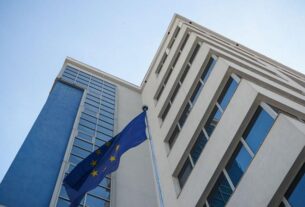According to all reports by European institutions on Serbia dealing with the rule of law, corruption is always a present and an ongoing issue to which attention is drawn. When it comes to recommendations, relevant institutions and international organizations continually propose adopting and fully implementing the new National Anti-corruption Strategy as a way of strengthening the fight against corruption.
Fight against corruption is one of the four main pillars of the negotiating chapter 23, dealing with the rule of law, judiciary and fundamental rights, within the Serbian EU integration process.
Council of Europe’s Group of States against Corruption (GRECO) highlighted in its last report that Serbia still needs to “prepare a new anti-corruption strategy, accompanied by an action plan and to establish an effective coordination mechanism”.
Further, the last European Commission’s report from 2021 included implementation of the same Strategy in the three most important recommendations, stating that there is a clear need for it “accompanied by a credible action plan in addition to the relevant section in the chapter 23 Action plan”.
The last National Anti-corruption Strategy in Serbia was adopted in 2013 and expired five years later – in 2018. Since then, no further steps forward were made so far to adopt a new one.
Previous strategy not adequately implemented
The Anti-corruption agency was responsible for the Strategy’s implementation, and according to many sources – their work was done well, with brief reports published every year.
However, problems would occur when it comes to the Parliament. The Serbian legislative body hadn’t had any discussions on the reports, nor ever ensured its full implementation, which consequently made the Strategy meaningless.
Local organizations dealing with corruption in the Serbian system, such as Transparency Serbia and Belgrade Centre for Security Policy, used to characterize in their reports the previous Strategy as just a piece of paper, without any relevant influence in practice.
Program director of Transparency Serbia Nemanja Nenadić explained for EWB that is clear that the results of the previous Strategy were far away from its set goals, repeating that there was never any parliamentary discussion regarding it.
He stated that one of the problems from 2016 was prioritizing the Action plan for chapter 23 over the National Anti-corruption Strategy. He believes, and Transparency highlighted that many times in the previous years, that “corruption is a problem that Serbia needs to solve regardless of its foreign policy orientation”.
Head of Information, Communication and Press of EU Delegation in Serbia Paul-Henri Presset agreed that implementation of the Strategy is “crucial”, stating that “policy document of any type cannot by itself solve the problems in the sector that it addresses”.
Will the new Strategy be the key?
Ambassador and Head of EU Delegation to the Republic of Serbia Emanuele Giaufret stated at the Regional SELDI forum in Belgrade organized by the Centre for Contemporary Politics that the fight against corruption is “crucial” for EU integration, adding that Serbian implementation of National Anti-corruption Strategy was very “timid” so far.
On the other hand, US Ambassador in Belgrade Cristopher Hill highlighted at the same event that fight against corruption is “crucial for every society”.
However, it seems that these repetitive “warnings” simply do not reach relevant institutions and corruption remains a huge problem for the Serbian society.
In anticipation of the National Strategy, Serbia adopted four operational plans for eight high-risk fields, but the Program Director of Transparency explained that their quality is uneven and, in some cases, even weak, without all relevant institutions being involved in creating them.
“Without the relevant National Strategy, those action plans are just random steps without a clear goal. On the other hand, relevant institutions need to invest a lot in the future Strategy, in order to make a strong and binding document, with all necessary elements and according to the EU legislation”, said Nenadić.
In order to be effective, the new Strategy should be followed by an action plan, “with agreed timelines and planned budgetary commitments” stated Presset from EU Delegation in Serbia, adding that “most importantly, there needs to be a strong willingness by the Government and all involved institutions to ensure that the policy is efficient and is achieving its goals”.
For now, however, it appears that this kind of willingness is simply missing.
Nenadić thinks that the new Strategy should be adopted by the Parliament and not by the Government because as he explained, this kind of document should be also covering fields “which are beyond the jurisdiction of the executive”.
According to the plans, the new National Strategy should be made by the end of this year, but the work on it “hasn’t even started yet”, Nenadić added, concluding that in the end “the success of any strategy depends on those who will control its implementation”.
This article was published as part of the project “Civil society for good governance and anti-corruption in southeast Europe: Capacity building for monitoring, advocacy and awareness-raising (SELDI)” funded by the European Union.
The post Delays in adopting a new Anti-corruption Strategy in Serbia: Wandering without clear goals appeared first on European Western Balkans.





